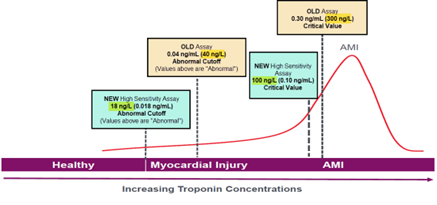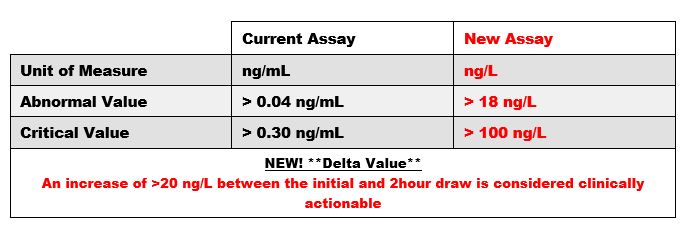Share:
High-sensitivity troponin test comes to Asante
The test comes with some changes you’ll need to know.
Asante is moving to a new troponin I, high-sensitivity test (hsTnI) which goes live on Feb. 28. This new high-sensitivity test replaces the previous troponin I test throughout Asante.
With this, there are important changes you need to know.
The new assay is more sensitive to detection of myocardial injury.

There are two types of orders for the hsTn1 test:
- Two-hour protocol: Used for new-onset symptoms of acute coronary syndrome. It includes an initial troponin draw and then a two-hour follow-up draw.
- Stand-alone troponin test: Used for subsequent tests or troponin testing that does not require a two-hour protocol.
New critical values and reporting:
- Please note the unit of measure change (ng/mL to ng/L).
- A new reporting consideration is the delta value. The delta value is a change between two values.
- The delta value is used with the two-hour protocol. Delta increases can alert providers that the patient may be on the trajectory toward acute myocardial infarction (AMI).
- If the second hsTnI at the two-hour mark increases by > 20 ng/L, it is considered a critical value.
- Lab will notify the nurse of the delta value increase.

Important points on interpreting hsTnI results:
- A single hsTnI result often cannot be used alone for clinical decisions.
- Abnormal values (> 18ng/L) do not always indicate AMI.
- An elevated hsTnI can be associated with other conditions causing cardiac injury. Providers should evaluate all possible causes and the delta value.
- The two-hour hsTnI values are important because a percentage of AMI patients will have an initial hsTnI result that is normal (0-18 ng/L).
In summary:
- Remember the new units of measure (ng/L), new abnormal value (>18ng/L) and new critical values (>100 ng/L and/or delta change of >20 ng/L).
- There are two orders for this test: the two-hour protocol and a stand-alone protocol.
For questions about the new hsTnI laboratory test, reach out to:
- Jamey Licata, ARRMC Lab chemistry technical specialist, (541) 789-4175.
- Jessica Lambert, ATRMC Lab chemistry technical specialist, (541) 472-7181.
- Tom Arnold, AACH Lab supervisor, (541) 201-4047.
If you have a question, please contact the author or relevant department directly.



